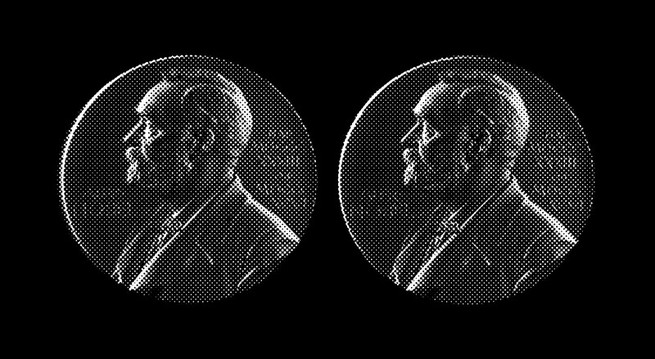A Nobel Prize for Artificial Intelligence
3 min read
This is Atlantic Intelligence, a newsletter in which our writers help you wrap your mind around artificial intelligence and a new machine age. Sign up here.
The list of Nobel laureates reads like a collection of humanity’s greatest treasures: Albert Einstein, Marie Curie, Francis Crick, Toni Morrison. As of this morning, it also includes two physicists whose research, in the 1980s, laid the foundations for modern artificial intelligence.
Earlier today, the 2024 Nobel Prize in Physics was awarded to John Hopfield and Geoffrey Hinton for using “tools from physics to develop methods that are the foundation of today’s powerful machine learning.” Hinton is sometimes referred to as a “godfather of AI,” and today’s prize—one that is intended for those whose work has conferred “the greatest benefit to humankind”—would seem to mark the generative-AI revolution, and tech executives’ grand pronouncements about the prosperity that ChatGPT and its brethren are bringing, as a fait accompli.
Not so fast. Committee members announcing the prize, while gesturing to generative AI, did not mention ChatGPT. Instead, their focus was on the grounded ways in which Hopfield and Hinton’s research, which enabled the statistical analysis of enormous datasets, has transformed physics, chemistry, biology, and more. As I wrote in an article today, the award “should not be taken as a prediction of a science-fictional utopia or dystopia to come so much as a recognition of all the ways that AI has already changed the world.”
AI models will continue to change the world, but AI’s proven applications should not be confused with Big Tech’s prophecies. Machines that can “learn” from large datasets are the stuff of yesterday’s news, and superintelligent machines that replace humans remain the stuff of yesterday’s novels. Let’s not forget that.

AI’s Penicillin and X-Ray Moment
By Matteo Wong
Today, John Hopfield and Geoffrey Hinton received the Nobel Prize in Physics for groundbreaking statistical methods that have advanced physics, chemistry, biology, and more. In the announcement, Ellen Moons, the chair of the Nobel Committee for Physics and a physicist at Karlstad University, celebrated the two laureates’ work, which used “fundamental concepts from statistical physics to design artificial neural networks” that can “find patterns in large data sets.” She mentioned applications of their research in astrophysics and medical diagnosis, as well as in daily technologies such as facial recognition and language translation. She even alluded to the changes and challenges that AI may bring in the future. But she did not mention ChatGPT, widespread automation and the resulting global economic upheaval or prosperity, or the possibility of eliminating all disease with AI, as tech executives are wont to do.
Read the full article.
What to Read Next
- Today’s Nobel Prize announcement focused largely on the use of AI for scientific research. In an article last year, I reported on how machine learning is making science faster and less human, in turn “challenging the very nature of discovery.”
- Whether the future will be awash with superintelligent chatbots, however, is far from certain. In July, my colleague Charlie Warzel spoke with Sam Altman and Ariana Huffington about an AI-based health-care venture they recently launched, and came away with the impression that AI is becoming an “industry powered by blind faith.”
P.S.
A couple weeks ago, I had the pleasure of speaking with Terence Tao, perhaps the world’s greatest living mathematician, about his perceptions of today’s generative AI and his vision for an entirely new, “industrial-scale” mathematics that AI could one day enable. I found our conversation fascinating, and hope you will as well.
— Matteo



